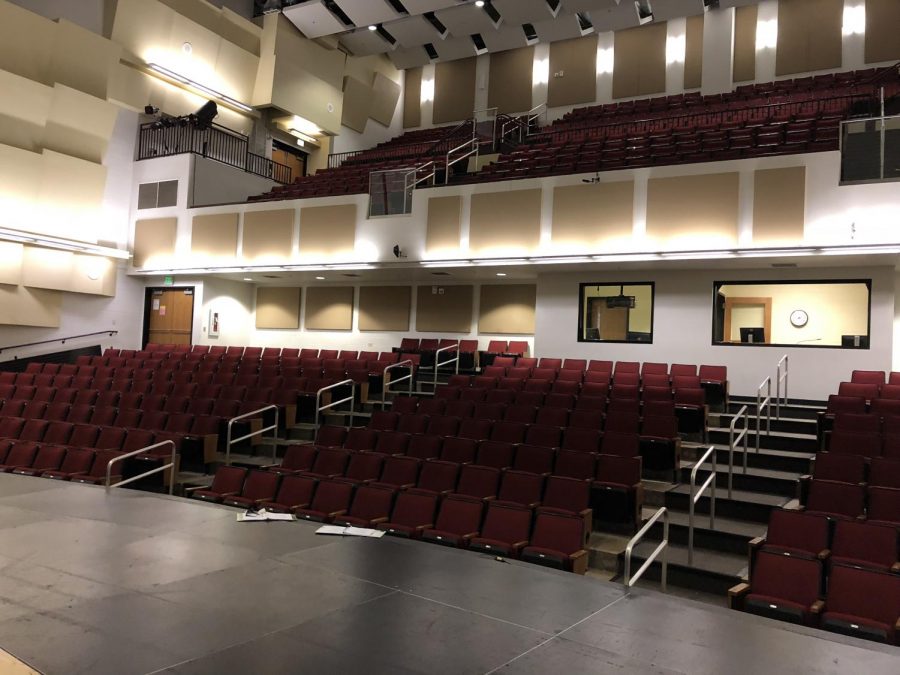A Look at the Man Behind the Curtain
October 5, 2018
Creating a show is a long process that stretches over a period of 3-4 months. Long hours and effort are put by actor, technical crew (techies), parents, and staff members alike. For a production to be successful, both actors and techies will have to meet their deadlines for their specific jobs. This year things are a little different, for the show was mainly cast straight out of the Advanced Acting class, making it only necessary to do rehearsals two nights a week.
Right now actors are quickly trying to memorize lines, for they are given a month before they must be off book. The actors’ main job until the final show is to know their lines, remember their blocking (where you move on stage), show up on time, and make decisions about their character.
One of the most important jobs in the theatre is set design. Before the audience sees the anything else, they are greeted with the sight of twelve foot walls, a beautiful handmade chandelier, or winding stair cases. The set brings the stage from just a hole in the wall to a believable world where each character could reasonably live. Before construction can even begin to start, the set designer must make create multiple different drafts of the stage from every possible angle. This year the set is rotating, so there will be a run crew who will run on and move the set in between scenes.
After the set design is in place, it’s time for the shop foreman to create a buy-list based off what we already have and what we need to make the design a reality. After a few weeks, the pieces are delivered to Coronado High School where the crew members then unload all the materials into the shop. With all the pieces attained, it’s time to start assembling them like an elaborate puzzle. There are usually about three work days held on Saturdays that go from 10am-3pm that any one in the Coronado community is allowed to attend to help construct the set. The shop foreman is expected to attend these work days acting as main builder, manager, and supervisor.
Now that the set is all built and the actors are acting, we need people to come to the show. The publicity manager is tasked with advertising the show to the public, which includes designing and creating the poster, posting updates on social media, and making announcements via the daily announcements and KUGRTV.
“The most tedious of my tasks as publicity manager is creating and designing the program. Because I’m also a stage manager, I have to divide my attention between publicity and stage managing. This year we have a cast of almost 30 and a large crew, so it will probably end up taking the next 2ish months to completely finish the program,” said the publicity manager Evelyn Gillum, 12, about her duties in the production.
How lame would it be if Romeo walked on stage in blue jeans and a graphic tee? It would bring everyone in the audience out of the show! That is why costuming and makeup crew are so essential. Costuming is in charge of making sure that each actor is wearing an outfit that makes them look like they belong in the world that the set built, and captures the personality of the character. Makeup crew works closely with costuming to make sure the actor’s face matches. Makeup crew is also in charge of shadowing each actor’s face so they don’t get drowned out by the lights.
The light crew works up in the booth along with the sound crew. Light crew makes sure that each part of the stage is properly lit. They also help with special effects. For example, in 12 angry jurors they flashed lights backstage to simulate lightning. The sound crew also helps with special effects by adding in noises to create emphasis in scenes.
Overlooking every group from actors to techies is the stage manager. The stage manager works right with the director, taking notes and making sure everyone meets deadlines (basically the director’s assistant). As stage manager, you must attend every rehearsal and every work day . Stage managers pull each group together, so without stage managers a show really wouldn’t happen.
Each year every position is chosen either by interviews of students in the tech class, or by students auditioning for roles, but if you’re interested in helping out this year, the next 2 work days will be held October 13th and October 20th from 10:00-3:00pm.


